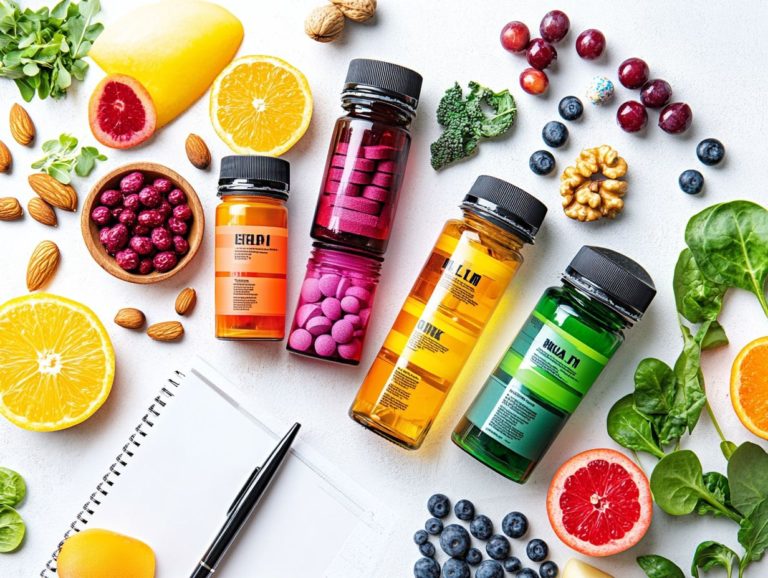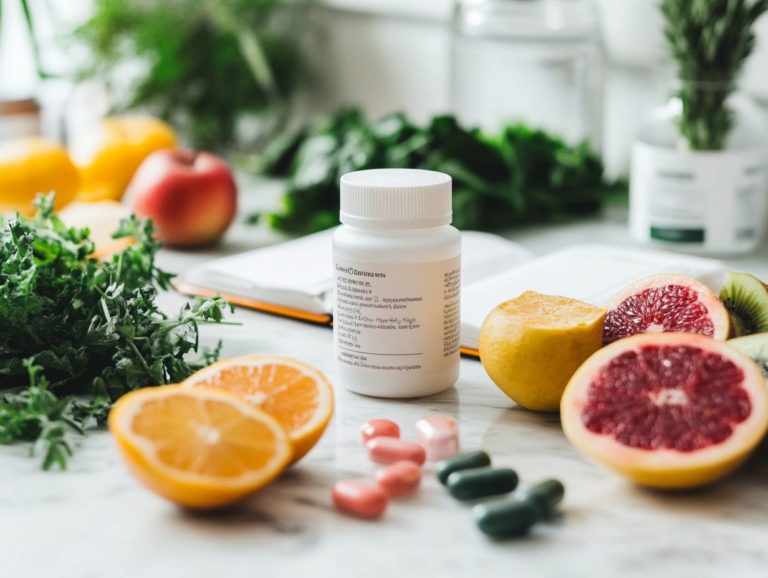How to Spot Quality Supplements on the Market
Navigating a complex market of dietary supplements can feel overwhelming, especially with the many products at your fingertips.
Understanding regulations is key to making smart choices that truly serve your health. This guide delves into the vital aspects of supplement quality, from deciphering labels and researching brands to spotting common red flags.
You ll also discover the significance of third-party testing and when to talk to a doctor. Take charge of your health today by arming yourself with the knowledge to select the best supplements tailored to your unique needs.
Contents
- Key Takeaways:
- Understanding Supplement Regulations
- Label Reading for Supplement Quality
- Researching Supplement Brands
- Common Red Flags in Supplement Quality
- Supplement Testing and Certification
- Consulting with a Healthcare Professional
- Frequently Asked Questions
- 1. What should I look for when trying to identify quality supplements in the market?
- 2. Are all supplements created equal?
- 3. Why is it important to identify quality supplements in the market?
- 4. How can I tell if a supplement is made with high-quality ingredients?
- 5. Are there warning signs that indicate a supplement may not be of good quality?
- 6. Can I trust online reviews when trying to determine the quality of a supplement?
Key Takeaways:
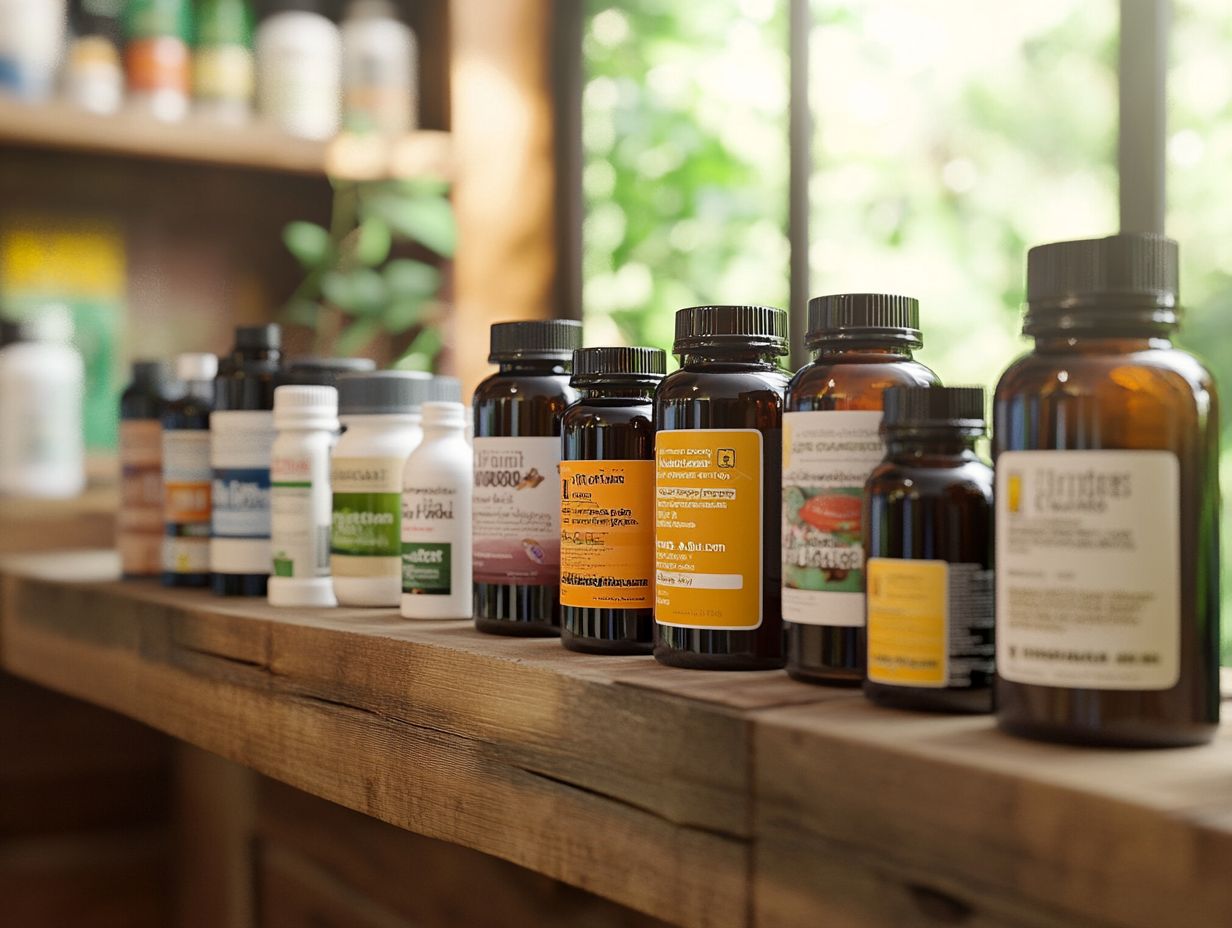
Look for supplements with clear and accurate labels that include key information like ingredients, dosage, and manufacturer information.
Avoid supplements with potentially harmful ingredients like fillers, preservatives, and artificial colors or flavors.
Consider choosing supplements that have been tested and certified by third-party organizations for added quality assurance.
Understanding Supplement Regulations
Understanding supplement regulations is crucial for you as a consumer seeking high-quality supplements that align with your dietary needs and ensure your safety.
The Dietary Supplement Health and Education Act lays down a framework for the dietary supplement market, establishing guidelines for labeling and quality control. By adhering to FDA regulations, you can protect yourself from harmful ingredients while promoting transparency in the health claims made by supplement brands.
Third-party testing and certification programs verify product safety and quality, ensuring you feel confident about the efficacy and safety of the supplements you choose.
Overview of FDA Regulations
FDA regulation is pivotal in overseeing the dietary supplement market, ensuring that you, as a consumer, can trust that brands comply with the Dietary Supplement Health and Education Act while prioritizing your protection.
These guidelines require that supplement labels are not only honest but also provide crucial information about ingredients, dosages, and potential allergens. Brands must skillfully navigate the complexities of making health claims, which are stringently regulated to prevent misleading information.
Adhering to these rigorous labeling and marketing standards is crucial, as it directly impacts your safety. By enforcing these regulations, the FDA promotes transparency in the industry, giving you the power to make informed decisions about your health while minimizing the risk of encountering unsafe or ineffective products.
Label Reading for Supplement Quality
Label reading is an essential skill for you as a consumer seeking to choose high-quality dietary supplements. It equips you with crucial information about ingredients, dosage instructions, and third-party testing certifications, ensuring you make informed decisions for your health.
Key Information to Look for on Labels
When you evaluate supplement labels, it s essential to hone in on key information such as dosage instructions, the presence of vitamins and minerals, and certifications from third-party testing. This ensures you re selecting quality supplements that effectively address your nutritional needs.
Understanding the daily values of essential nutrients can significantly enhance your health choices, allowing you to align your supplement intake with your specific dietary requirements.
For instance, checking the percentage of daily values helps you determine if a product offers adequate amounts of critical vitamins and minerals. Look for reputable certification seals like NSF or USP, which signify that the supplement has undergone rigorous testing for quality and purity.
It s also important to pay attention to dosage recommendations, as excessive intake of certain vitamins can lead to unwanted side effects. By thoroughly reviewing these aspects, you can make informed decisions that promote your optimal health.
Researching Supplement Brands
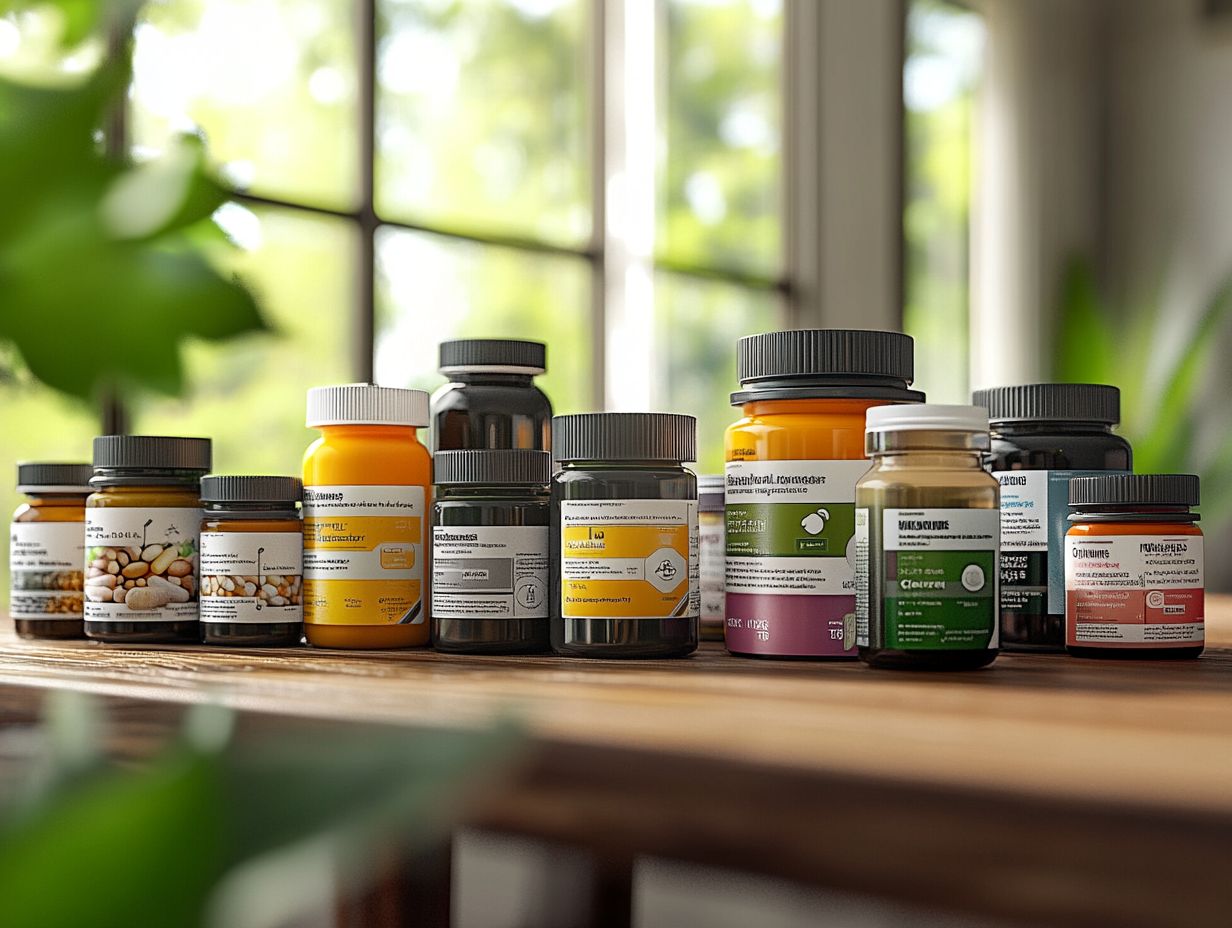
Researching supplement brands is vital for you to pinpoint reputable sources that offer high-quality dietary supplements.
Look for those supported by peer-reviewed literature and glowing consumer feedback, ensuring you choose products that truly meet your health needs.
Start researching and selecting supplements today based on the knowledge gained from this guide!
Reliable Sources for Brand Information
To ensure the reliability of supplement brands, you should turn to reputable sources like ConsumerLab.com and peer-reviewed literature that assess efficacy and safety of various dietary supplements on the market. By doing this, you ll gain a more comprehensive understanding of the products you re considering for your health routine.
Engaging with established third-party resources not only enriches your knowledge but also shields you from misleading claims that often accompany health supplements.
Examining peer-reviewed studies allows you to discover what scientific research reveals about specific ingredients and their purported benefits, empowering you to make informed decisions instead of falling for marketing hype.
Ultimately, thorough investigation is essential to ensure that the supplements you choose are both safe and beneficial.
Common Red Flags in Supplement Quality
Recognizing common red flags in supplement quality is essential for guaranteeing your safety when it comes to dietary supplements.
Harmful ingredients and the absence of independent testing by organizations that aren t involved in making the product can present considerable risks to you as a consumer.
Ingredients to Avoid
To ensure the safety of your dietary supplements, it’s crucial to be vigilant about harmful ingredients that often lurk in low-quality products. You want to make certain that the vitamins and supplements you choose are devoid of potentially dangerous substances.
Be proactive! Avoid products containing harmful substances like artificial sweeteners, such as aspartame and saccharin. While they might be added to improve flavor, they can lead to a range of health concerns, such as headaches and digestive issues.
Some ingredients can be harmful. Certain heavy metals can find their way into supplements, posing a risk of significant neurological damage over time.
To protect your well-being, it’s essential to seek out products that undergo careful checks, ensuring the absence of these harmful substances.
Reputable manufacturers typically offer third-party testing certifications, giving you peace of mind that the supplements you select are both safe and effective, thereby supporting your overall health with reliability.
Supplement Testing and Certification
Supplement testing and certification are crucial steps that uphold the integrity and quality of products in the dietary supplement market.
By prioritizing these processes, you empower yourself as a consumer to make informed choices that align with your health and wellness goals.
Third-Party Testing and Certification Programs
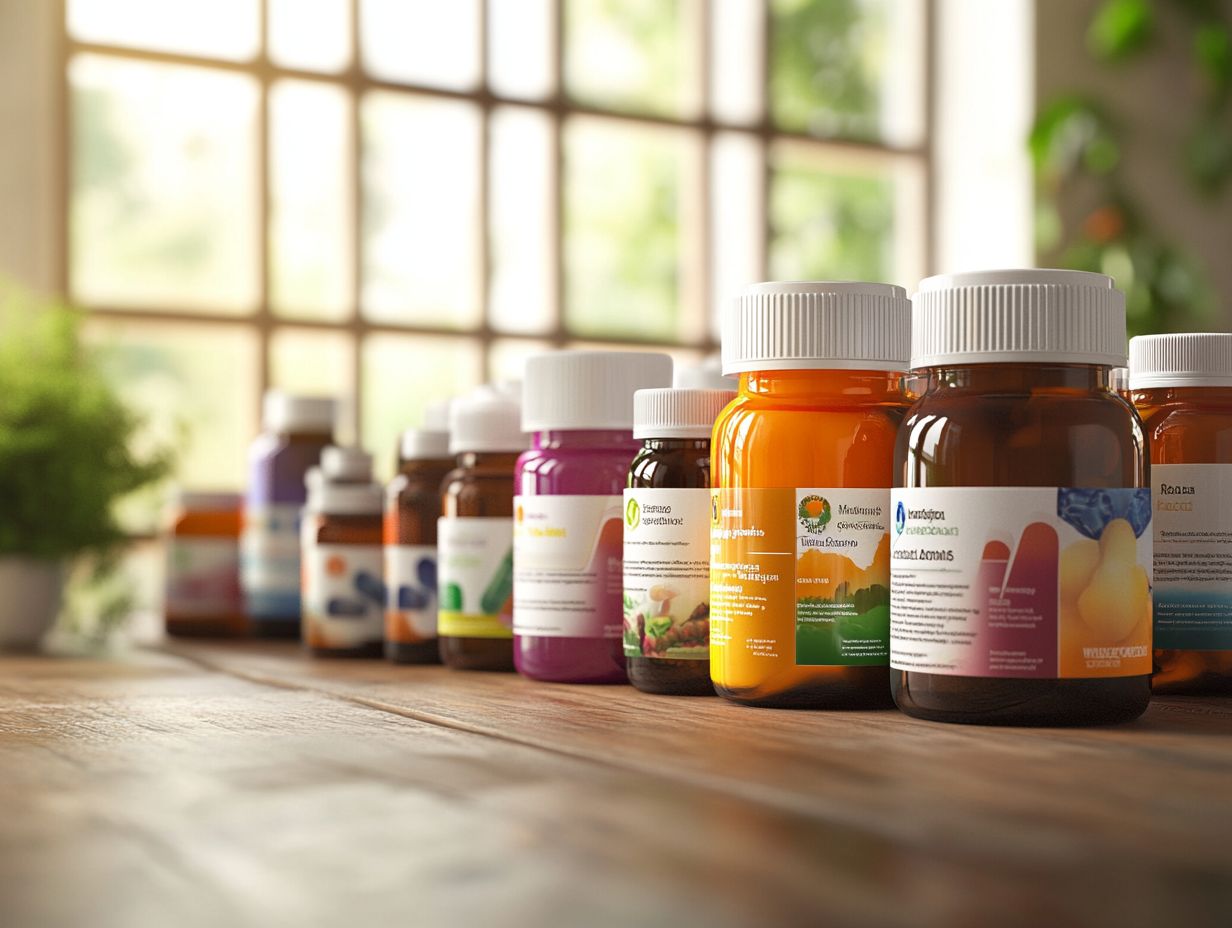
Third-party testing and certification programs, like those offered by NSF International and the U.S. Pharmacopeia, are vital in ensuring the safety and quality of dietary supplements for you as a consumer.
These assessments involve careful checks, comparing product labels against their actual contents and testing for contaminants that could pose health risks.
By seeking out these certifications, you can select products with greater confidence, knowing they not only meet your health needs but also adhere to stringent safety standards.
When you see recognized certifications, it indicates that a product has undergone extensive scrutiny, empowering you to make informed decisions.
Ultimately, these credentials serve as a protective measure against misleading claims, fostering a sense of trust and transparency in the dietary supplement industry.
Consulting with a Healthcare Professional
Consulting with a healthcare professional is an invaluable step for you if you re seeking personalized supplementation recommendations that align perfectly with your unique dietary needs and health conditions.
This tailored guidance can make all the difference in optimizing your well-being.
Take the first step towards better health by consulting a professional today!
When to Seek Professional Guidance
Are you confused about which supplements to take? Knowing when to seek professional guidance can make all the difference in your health journey. This is essential for your health, especially if you have existing health issues like diabetes or heart problems, where some supplements could interfere with your medications.
For those with specific dietary restrictions, like being vegan or having food allergies, consulting a healthcare professional can help identify which nutrients you may be lacking. This way, you can effectively address those gaps.
When diving into the world of megadose vitamins, the risks of excessive intake can be significant. Therefore, professional advice is critical for safe and effective supplementation. Expert advice helps you choose the right supplements for better health while reducing risks.
Frequently Asked Questions
1. What should I look for when trying to identify quality supplements in the market?
When searching for quality supplements, make sure to check the label for third-party certification marks, like USP or NSF. Additionally, look for keywords like pure, organic, and non-GMO to ensure the supplement is made with quality ingredients.
2. Are all supplements created equal?
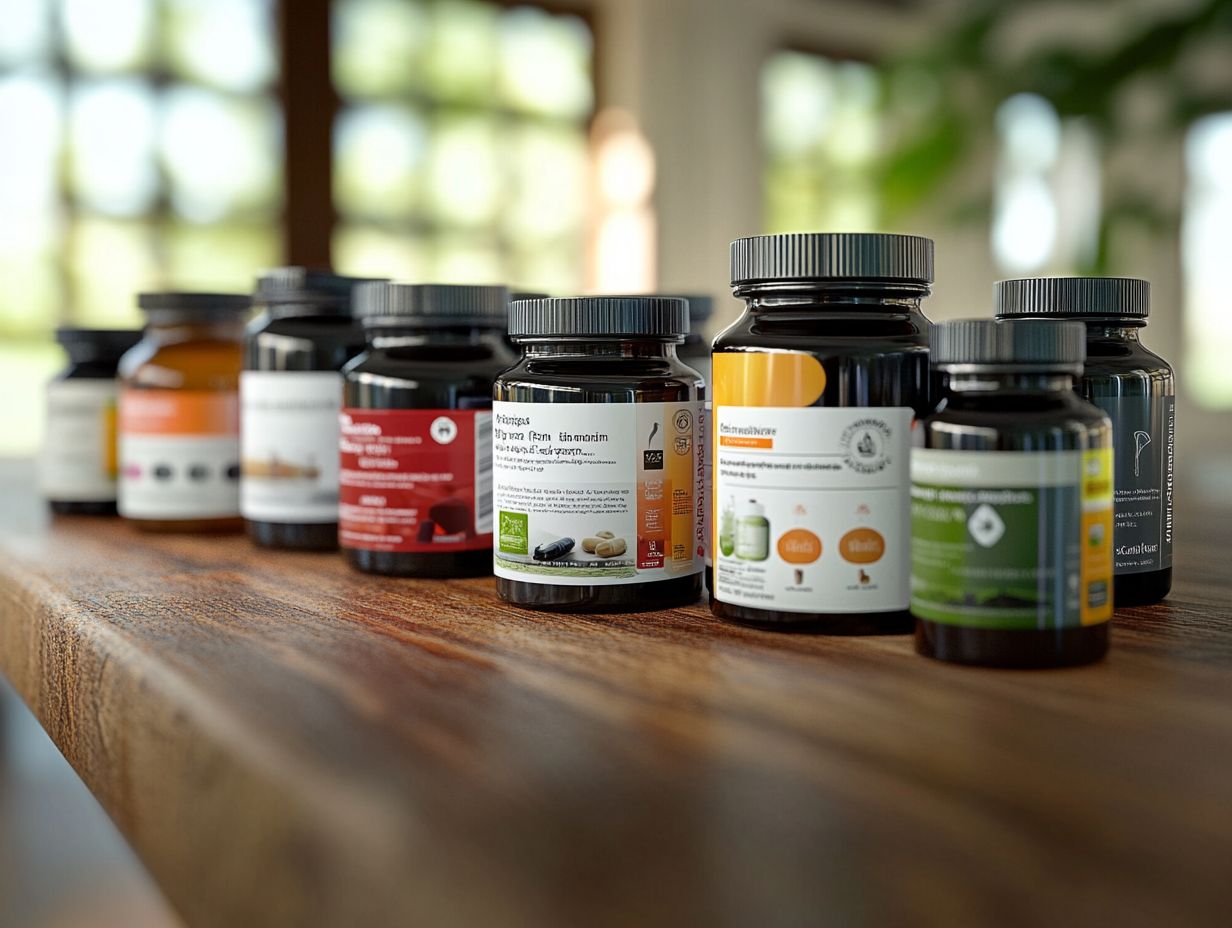
No, not all supplements are created equal. The quality and effectiveness of supplements can vary widely, so it s important to research and seek reputable brands that prioritize quality and safety.
3. Why is it important to identify quality supplements in the market?
Choosing quality supplements is crucial because not all supplements may be safe or effective. Poor-quality supplements can contain harmful ingredients or fail to deliver the desired effects, wasting your money and potentially jeopardizing your health.
4. How can I tell if a supplement is made with high-quality ingredients?
One way to know if a supplement is made with high-quality ingredients is to check the label for specific information about the sourcing and production of the ingredients. Look for supplements that use whole food sources and avoid those with fillers and additives.
5. Are there warning signs that indicate a supplement may not be of good quality?
Yes, there are some warning signs to watch out for when trying to identify poor-quality supplements. These include unclear or misleading labeling, lack of information about sourcing and production, and prices that seem excessively low for the supplement.
6. Can I trust online reviews when trying to determine the quality of a supplement?
While online reviews can provide useful information, they should not be the sole factor in determining a supplement’s quality. It’s also important to consider the brand’s reputation, certifications, and sourcing of ingredients to get a complete picture of the supplement’s quality.



